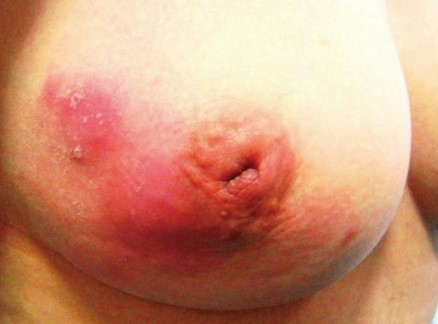Chronic Granulomatous Mastitis (CGM)
It is a rare, chronic and benign inflammatory disease of the breast, where the management is challenging and difficult due to unknown etiology and diagnosis.
Presentation
- Varied presentation of breast infection and painful breast lump
- Painful, firm and vague breast mass
- Sinus infection
- Palpable and hardening breast mass may present like signs of breast carcinoma
- Presentation of lesions usually around nipple (periareolar) or diffuse
- Recurrent breast abscess

Causes / Etiology
- Unknown
- May be related to Autoimmune, undetected microorganism, use of oral contraceptives (OCPs), smoking, DM, Hyperprolactinemia, viruses, parasitic infection
- Diagnosis of exclusion after rule out malignancy, and other granulomatous disease suchs as TB, Sarcoidosis
Investigation
- Breast Ultrasound: Discrete or irregular mass, ill-defined margins, parenchymal heterogenous appearance, Abscess formation, occasionally with enlarged axillary lymph nodes.
- Mammography: assymetrical density, skin thickening
- Core Biopsy / Surgical Excision Biopsy of mass is mandatory to establish diagnosis and rule out malignancy
- Serology or bacterial test
Histopathology examination of CGM
- Presence of epitheloid histiocytes, lymphocytes, plasma cells, leukocytes, multinucleated giant cells without caseous necrosis.
Treatment / Management
- No standarised treatment strategy established
- Drainage of abscess, wide local excision,
- Antibiotics
- Use of steroids : *Oral Prednisolone (0.5mg -1mg/kg) for 2 weeks with gradual tapering dose
- Average time of resolution of symptoms after drainage is 3-5months.
- Proper treatment is shown by regression of skin lesions and parenchymal induration after 2 weeks of therapy
- Complete residual lesion may take up to 6-12 months.
- Recurrence is common (20-50%)
- In severe long term cases, sometimes, mastectomy may be necessary
*Prednisolone – Oral corticosteroid therapy
- Its an anti-inflammatory, vasocontrictive, antiprolieferative, immunosuppressive effects
- It suppresses your immune systems in conditions where your immune systems mistakenly attacks its own tissues and aggravate the disease.
- Short term side-effects (few months) : Changes in behavior, weight gain, Irritation of stomach lining, raised BP, change in blood sugar level, weakness of bones.
- Long term side-effects (months to years) : osteoporosis or fractures, cataracts, worsening diabetes
